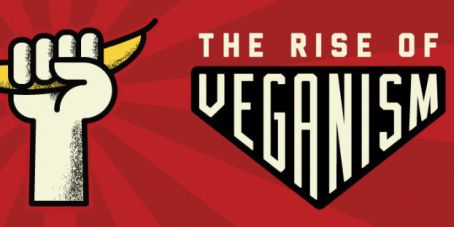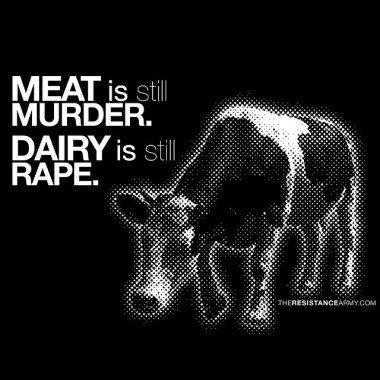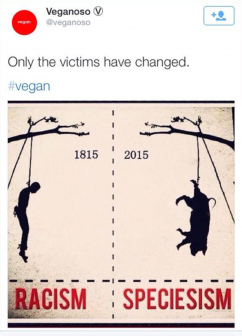TW: This post talks about rape, slavery and the holocaust which may be triggering for some readers.
As it’s #veganuary this month, I’ve seen a lot of people Instagramming pictures of their fridges filled with every vegetable imaginable, along with new recipes and dishes that they’re trying. Veganism has definitely become more popular recently, with many celebrities and influencers encouraging the switch to a plant based lifestyle. I want to start by saying that I think veganism is great; theoretically I have no problem with it and, as someone who is trying to cut back on their meat intake, applaud those who choose to lead such a healthy, environmentally friendly lifestyle which campaigns for animal welfare. However, recently I’ve become aware of a problematic side to the movement. I’m beginning to see more and more images online in which the lynching of black people is compared to the meat industry. After reading some articles, I learnt that many (white) vegans liken the meat industry to slavery and even the holocaust, and the artificial insemination of cows in the dairy industry to the rape of women. There are also many vegans who argue that you can’t be a feminist without being a vegan. Quite frankly, I find these images and arguments to not only be grounded in (white) privilege but also very disturbing.

I think that comparing the artificial insemination of cows with ‘rape rakes’ with human rape is wrong on so many levels. Using this language is undeniably insensitive and triggering for rape victims. Appropriating the word rape to describe the treatment of animals undermines the experience of human rape. I think that rape is a very human experience. It is not soley about non-consensual sex but about the assertion of dominance and power. Although I agree with the argument that artificially inseminating an animal is also about power, I think that this action is rooted in capitalism and financial gain. The human is not dominating the cow for its own physical pleasure, but rather the interest lies in making profit by creating more and more cows. Rape is not about pregnancy or making a baby – artificial insemination is. Furthermore, I believe that the psychological suffering of a human subjected to rape is incomparable with the suffering of animals who are subjected to similar treatment. As far as we know, animals do not have the same understanding of abstract notions of free-will, autonomy of the body, love or fear of social ostracism as humans do. Although an animal will undoubtedly suffer during the process of artificial insemination, I doubt that it will undergo the equivalent long-term psychological trauma to a human who has been raped. That is where I think the difference lies. I am not advocating the suffering of animals in any way. No animal or human should be forced to conceive under any circumstances. However, I strongly disagree with appropriating of the language of rape, which I think is a human experience, to describe what happens to animals. Using the language of rape to describe animal abuse is designed to upset us – I see it is a marketing technique to shock us into action. However, it also actively undermines the experiences of rape victims and is potentially triggering for many.

As much as the meat industry is disgusting, abusive and feeds into our consumerist capitalist desires for instant gratification, equating the treatment of animals to slavery is horrific and upsetting. The horrors of the slave trade or the holocaust should in no way be compared with those of the meat industry. Juxtaposing images of black lynching or concentration camps with the slaughter of an animal undeniably feeds into the dehumanisation of the Jewish community as well as black slaves and black bodies, a trope which is continually felt by black people today (consider white supremacy, Euro-centric beauty standards). It also alludes to the rhetoric that black or Jewish people are valued on the same level as animals. I understand that for a vegan this argument would be entirely correct as they see no difference between humans and animals. Yet, I see this argument as grounded in white privilege. White people have never systematically had their bodies reduced and compared to those of animals. Yet for black people, racist animalistic comparisons and the reduction and objectification of our bodies are continually perpetuated in today’s society (look at the uproar surrounding H&M’s recent campaign). For the Jewish community, comparing the meat industry with the holocaust is extremely antisemitic. Perhaps an argument could be made that the treatment of animals resembles a form of slavery, as the torture, killing and abuse of animals is undeniable. However, treating the two processes as equal undermines the experience of black and Jewish people and shows how little value white vegans have for black / Jewish history or black / Jewish lives. These insensitive and triggering images are designed to shock and appal us into undergoing ‘a dietary epiphany or awakening’. They simultaneously provoke white audiences whilst (deliberately?) alienating a black one. It sends a message to minority people that veganism is not for them. It is no surprise then that the vegan community is so often labelled as a place for white middle class feminism.
The term white veganism has emerged:
“White Veganism is a reference to mainstream veganism—which is, undeniably very white, narrow, one sided and ignores intersectionality. It aims to expose and erase the invisibility of oppression on other animal bodies to the masses, while simultaneously ignoring and being silent about the very visible injustice and oppression of black and brown bodies, femme bodies, or differently-abled bodies. Sometimes even utilizing the history of oppression on Black bodies and other oppressed groups as a tool to promote veganism.”
Just like white feminism, white veganism is grounded in privilege. In fact, I believe that veganism in itself is a privilege. Diet is undeniably a class issue and those with access to expensive organic foods, meat alternatives, vitamin substitutes, vegan makeup and cruelty-free beauty products are more financially privileged than others in society. These are luxuries that not everyone can afford. Veganism does not just consist of not eating meat, it is a lifestyle change concerning nearly all purchases you make. For many in the UK, going vegan is just not a viable option – and let’s not forget those who live in developing nations. Whilst those who can and who choose to go vegan should be praised and applauded, it is wrong to punish or demonise those who continue to eat meat. I believe veganism does go hand in hand with feminism; an equal society would undoubtedly place higher value on animal lives. Yet, I don’t think non-vegans are therefore ‘bad feminists’ or that vegan-feminists have an automatic moral high ground.

The wounds of slavery and the holocaust are still very much open, and the experiences of rape often leave long-term physical, psychological and emotional damage. I think it’s highly insensitive to take the brutal experiences or systematic oppression of one group and use them to advance the gains of another. If vegans advocate equality for all, why then is it ok to co-opt the suffering of black or Jewish people and rape victims, to take and diminish these experiences, in order to promote justice for animals? If vegans support compassion for all, why is the suffering of animals prioritised over the experiences and feelings of black or Jewish people and women? The hypocrisy is clear. Just as feminists should be intersectional, in acknowledging the interlinking struggles regarding race, class, disability and sexual orientation in their fight for equality, so too should vegans.



This is such a well written blog post, thank you for sharing! I’m an intersectional Vegan. Yes I am white and I understand that I am privileged due to my skin colour and social status. I want veganism to be as inclusive as possible and whole heartedly agree with everything you have said about the comparisons of animal agriculture and slavery/rape. I think part of the issue is that many people just haven’t thought about it enough in depth or learnt to see it the way in which you have described. So thank you for sharing this because it is so important!
LikeLiked by 1 person
Thank you for reading and commenting! I think it is such a shame when a sub-section of a movement undermines the main cause and become exclusionary or counterproductive. I enjoyed writing this blog and how it’s actually getting people to discuss something that I think is an important issue 🙂
LikeLiked by 1 person
I love this article! I completely agree with everything you’re saying. Veganism in and off itself is a viable concept, however the comparison of human and animal experiences is insensitive and takes things a little too far.
But I really love the way you explained it, it’s something that needs to come to light.
LikeLike
‘White people have never systematically had their bodies reduced and compared to those of animals.’ – have you ever considered where the word ‘slave’ actually comes from? Its from the word slav. Tens of thousands were sold in the Muslim slave trade, as indeed were many of your ancestors. Arab raids spread as far as Iceland. The only reason the black skin has become associated with slavery is because they were enslaved by the race/culture which currently has hegemony and hence dictates culture, of which your guilt complexes are a part of.
Honestly i don’t know you, and I know your intentions are good, but the use of white privilege by like minded individuals simply a less extreme manifestation of ‘liberal’ idiocy than this vegan rubbish.
LikeLike